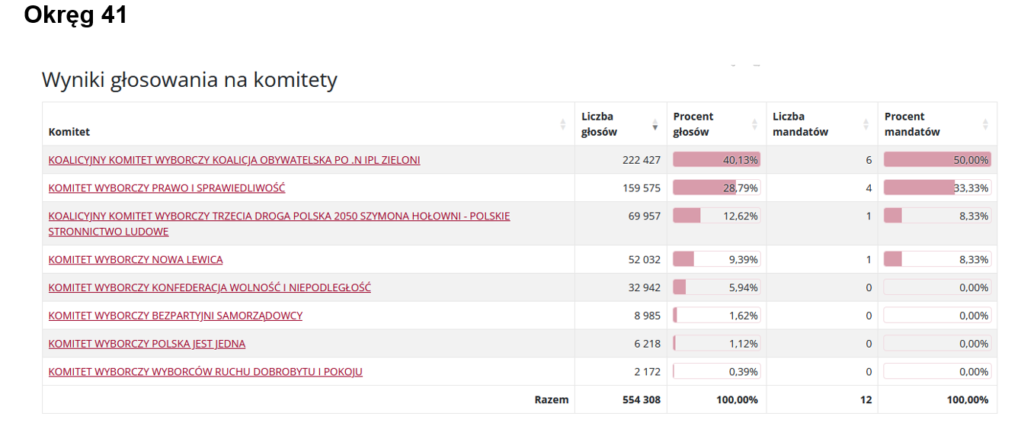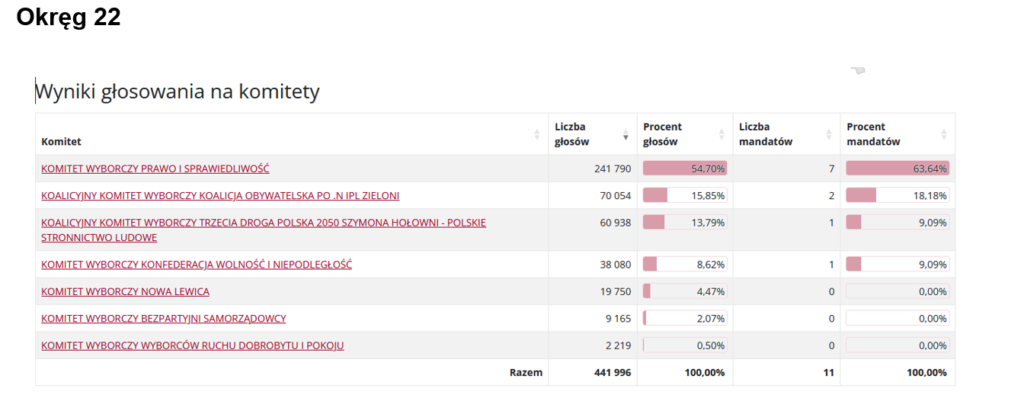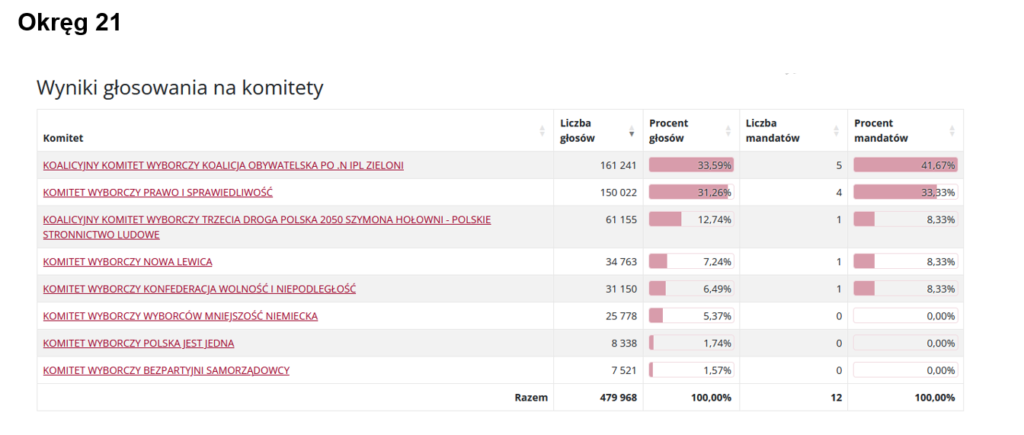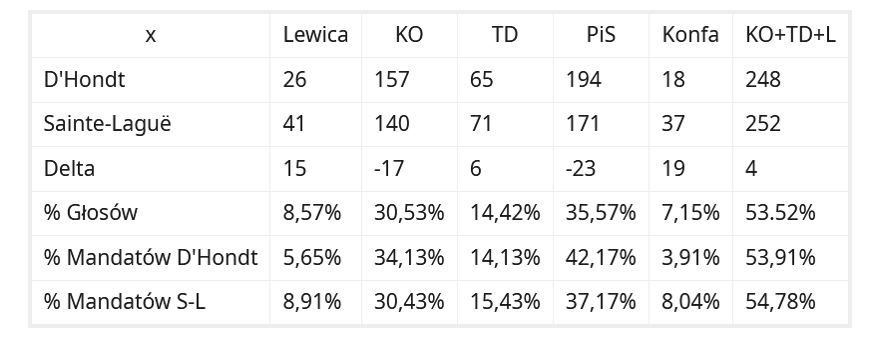Numbered votes, political calculations and attachments to the fresh government launched, we are facing an interesting post-election period. There is so no better time to talk about electoral ordination, as at the end of the election. For respective months there was a push for the coalition, places on the lists and at the end of the election campaign. Everyone, apart from a direct political group, was alternatively a spectator of this political show like an audience in the Colosseum, though without blood and gladiators.
When the emotions subsided, it is worth asking yourself – is this electoral strategy well built? Does it not advance what disgusts us in politics and discourages us? Does it not attract people we do not truly want, but we put up with them “because they are politicians”?
In my opinion, politics has always been and will be filled with cunning, deception, agreements and the desire to gain power. A badly built political system, and in this case elections, can strengthen these negative elements, and well built weakens. I will effort to present aspects that are worth changing in the current legislation, which can heal Polish democracy.
Larger eats the smaller ones – D`Hondt method
Let's start with the method of allocating election seats. Since the beginning of the 3rd Republic, we have utilized the D`Hondt method (except for the 1991 elections) I'm not going to give any definitions or historical facts here, even if it's on Wikipedia. I wanted to focus on the depth of the knowing of this strategy and the consequences it leads to.
The D`hondt method promotes larger parties due to its model of dividing the number of votes by successively 1,2,3,4 and 5. This way of sharing makes higher results more likely to get the most seats, percent more than the real number of votes put on the list, as mathematics is simply on their side. The following are 3 examples of electoral districts from these elections and the allocation of mandates:



In these examples, we see that a organization with the highest number of votes collects a higher percent of seats in the territory than it received a percent of votes, and parties with average scores can number on 1 ticket even if they achieved a good score of 12%.
Another component of this model is the "hidden winner bonus". In a situation where a group does not exceed the threshold, the parties with the highest score may collect additional seats due to a smaller division of votes at the first dividers by 1 and 2.
The direct effect of the D`Hondt model is to concrete the political scene and to believe that it is better to bet on a "tested large evil" than a "potential average or tiny alternative" for fear of a lost voice. It is simply a solid systemic conviction that does not decision us to look for and give opportunities to fresh or another smaller political parties, but to proceed in the current state of quasi-duopol political (collecting 66.08% of all votes in this election, but 76.3% of mandates). This is simply a continued ruthless fight for a parliamentary majority, which, as the last 8 years of independent regulation prove, is neither conducive to our economy nor our democracy. Sharing power is not pleasant, but with immature democracies – necessary.
Closer political measurement – Sainte-Laguë Method
Little is said in Poland that the D`Hondt method is not the only way to divide mandates. There are others like the Sainte-Laguë or Hare-Nieyer method, but given the specificity of the immaturity of our democracy, I would not aim for fragmentation, but for a more centered method of adequate representation. A model that would give a better political reality on the occasion, prompting average political hazard to organization alternatives, but inactive giving a chance to build majority governments.
After examining respective models of allocations, I am inclined to Sainte-Laguë. At the beginning, I would like to point out that I am not a large fan of direct support for the starting political parties, which, on a wave of emotion, gain any part of power. In my opinion, the fresh political parties should take peculiar care of interior stableness issues for respective term, alternatively than being a "political single-gun" (Kukiz15, Palikot Movement, Modern, PJJ). I value political stability, but with the ability to vote for alternate but unchangeable another political parties. 1 cannot neglect to announcement that the concept of systemic support for large parties in order to accomplish a parliamentary majority shows the pathology of independent governments alternatively than their stability.
For the purposes of this article I found a conversion of votes according to both methods (to the condition of the first at night, so it is an exit poll, not a final poll) but the differences can be seen more clearly. The number of votes shall yield a real election result.

Searching the Internet, I besides found a paper on the 2019 elections.
[1]"We have calculated the Sainte-Laguë method, territory by district, results of October elections. The effect of our calculations is shown in the table below. The parliament so elected would be completely different. The PiS would not have 235 seats, but 200, would receive almost the same percent as the votes (43.47%). These 200 mandates would correspond to the party's influence in society. Jarosław Kaczyński, in order to rule, would gotta search an ally either in the Confederate or in the PSL. What is interesting is the result of the Confederation – she in the Sainte-Laguë strategy would gain the most, alternatively of 11 Members would have as many as 36 (7.82% of the mandates!). The state of ownership would besides increase the Left and the PSL – both committees would gain 10 MPs each. On the another hand, the Platform would lose 10 seats and have a club of 124 MPs in the Sejm."
[1] Source: https://www.weeklykoverview.pl/if-county-glosy-method-sante-lague-pis-had-200-poslow/
An crucial aspect of power, and specifically its legitimacy, is the corresponding ratio of the percent of votes to the mandates occupied. Voters should be convinced that their voice will not be lost, but adequate to support their organization (who crossed the electoral threshold). The proposed Sainte-Laguë model will besides have further effects on our democracy. Political emotional blackmail of the alleged "lost voice" or "only strong will defeat the authorities" will weaken, and will strengthen the average parties that may prove to be a essential alternate or a mandatory coalition looking "the bigger" at their hands. It will besides motivate the environment to build new, well-organised parties due to the chance of a good program and reliability, even without having a large possible electorate.
Members closer to their districts – mixed electoral system
I think many of you have met with concepts specified as "election locomotivators" or "sandochronists". For the sake of argument, I will rapidly explain these concepts.
"Electoral Locomotive" is simply a individual (most frequently on the "one" or the first place) who, due to its constant or temporary popularity, picks up disproportionately more votes than those below the list. This causes that even if further seats have achieved mediocre results or were political mediocrity, they are drawn by this "locomotivation" due to the fact that yet the number of votes in the organization list in a given territory counts. The locomotives consequence in the entry into parliament of passive, mediocre but faithful people (the celebrated “BMW”).
The "fallers" are people completely unrelated to the region, but occupying advanced places on the list due to interior political agreements. Unsticked, having deep respect for their constituents, entering the parliament from the fact that “being in this only right party”.
As a consequence of the current strategy of electoral lists, the link between Members' representations to their voters and allegiance to organization leaders on whom real political destiny depends. They become pawns of political leaders alternatively than representatives of their districts, frequently making decisions contrary to the expectations of voters.
For known reasons, extremist change could not be accepted in Poland, so it is worth looking at solutions that bring us closer to the healing of the representation in Poland, but will not origin fear of a large political and election experiment. My proposal is simply a mixed electoral system. To clarify what this means: half of Members are elected by a majority strategy (one-mandate districts, a simple majority – Just like in the Senate.), whereas the another half – in a proportional strategy (Just like now in the Sejm). An additional protection against excessive dispersal of parliamentary groups, and thus – political instability – is the usage of the electoral threshold (5% for parliamentary elections, 3 mandates for majority elections).
This model will weaken the loyalty of political leaders, strengthen Members' attachment to their regions (by expanding force and a tendency not to support irrational political decisions) and let citizens to get to know their representatives better.
Members shall be accountable to the electors – the procedure for appeals
In the current legal state, Members of the TEORIA are accountable to the nation, namely the voters of the district. They do it erstwhile all 4 years during the election. In PRACTICE, most of the time they are covered by organization discipline. any politicians, for understandable reasons, effort to keep the temper in their district, but the freedom to act without political consequences causes Members to halt following ideas and become organization cynics and cyclicalists.
Assuming that we have introduced a mixed electoral strategy and in any way linked Members to our districts (at least half of them) it is worth giving citizens a tool to control and influence their representatives. specified a tool was a referendum on the dismissal of Members, but given the specificity of this tool, it will work more effectively in single-mandate districts.
JWould that work?
Pof the first It would should be a simple procedure for submitting a referendum, which could be done even via the net by a certain percent of voters who voted for the candidate. Obstructive procedures are the murderer of social and civic activity.
P2nd the associate could only cancel the community of the territory concerned. It is impossible for parties to hold bus reunions to remove their political opponent from another district.
Pthree o'clock, in order for the appeal to have an effect, the appeal threshold of 51% or 75% of the votes cast (numbers are only a proposal, they should be seriously analysed) for the candidate concerned. In addition, it would be worth introducing a provision, giving a chance to get a circumstantial "votum of trust", i.e. vote of support from its voters in the number of 75% of the votes cast during the elections.
PRexus: MP A received 1,000 votes in the election. In order for this associate to be dismissed during his word of office through a referendum, 510 or 750 votes for his dismissal in a single-mandate territory are needed. However, if he receives 750 votes of support (i.e. votes against his appeal), he immediately receives a “vote of trust” from his constituents and is not cancelled.
Another method would be an absolute majority vote. This means that the Member's appeal referendum would gotta scope a minimum of 50% of attendance in a given territory and the votes for appeal would should be more than those against appeal. It is crucial that the appeal reflects the opinion of the majority alternatively than just a loud handful.
P4 a.m. the appeal procedure could not be repeated more than erstwhile all 3 months with restrictions up to six months before and after the election to avoid a persistent run to destruct the candidate concerned.
Many experts would most likely find many better solutions and safeguards for this model against political distortion. The specified fact of a systemic solution allowing the dismissal of a associate is worth pointing out. I presume that in the beginning this tool will be imperfect and seldom used, but it will inactive be specified a anticipation and an opportunity. Let us not let ourselves be told that it is unnecessary, especially erstwhile politicians who fear civic control say it.
So what about the MPs in the organization letters? They'll stay unpunished? Here the case is more complicated, but I think that a akin procedure only taking into account the number of votes on the full list in a given territory would be a certain solution.
Internet voting? Why not?
A bit revolutionary (for Polish conditions) would be a proposal to vote in elections via the Internet. This is not a fresh solution, as our neighbours, Estonia, have been utilizing this model since 2005. However, let us be aware that there is simply a immense undertaking to make and safe the IT system. We are making advancement here, but we are inactive mostly backward.
Let this point be a kind of motivation to change the e-voting system, not only in elections, but besides in smaller cases specified as referendums or appeals of mayors/wows/wows.
Following the rule of “look at how they do it better than us” I present the model of online voting in Estonia
- Logging in with PIN and e-ID or utilizing a telephone number (s SMS confirmation) in an application downloaded from a government website
- Verification of the user and holding of voting rights
- Show list of candidates in the voting constituency
- Selection of candidate and encryption of information
- Confirmation of vote by electronic signature
- Confirmation of registration in the voting system
In addition, a citizen may usage respective methods as a warrant of vote:
– multiple change of selected candidate in elections held over the network,
– cancellation of vote and re-vote in a conventional paper-based way at the polling station
– check your e-voice to verify that no 1 is impersonating them.
I absolutely do not think that this should be a compulsory method for all, but an alternate for the willing, especially for those who, for whatever reason, live in a different place than this check-in.
Cezary Skwarło










![A gdyby śmierci nie było? [o „Trzecim królestwie” Knausgårda]](https://krytykapolityczna.pl/wp-content/uploads/2025/07/Szablon-rozmiaru-obrazkow-na-strone-2.png)






